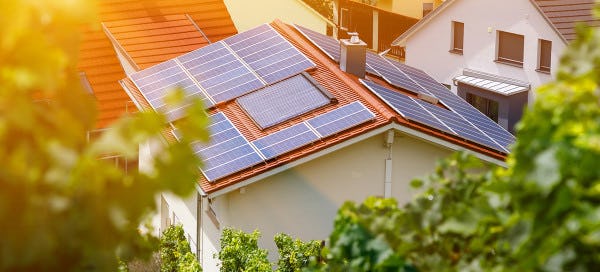Home and business owners are using solar panels to fight climate change and break away from utility companies. Although going solar has many benefits, solar panels have a considerable disadvantage. They don't work when the sun isn't shining.
But there is a solution: solar energy storage. Combining your solar panel system with energy storage makes it possible to use solar energy when the sun isn't shining. Not only does this create reliable backup power, but it saves you money and provides many other benefits.
Solar Energy Storage
Solar energy storage gets divided into thermal, mechanical, and battery storage.
Thermal Storage
Thermal energy storage absorbs and retains heat from the sun using various materials, like water or molten salt. This heated medium is kept in an insulated tank until it's time to use it, which usually involves boiling water for steam-driven energy production.
Mechanical Storage
To generate electricity, mechanical energy storage uses the potential energy of an object. Excess electrical power gets transformed into mechanical energy, then converted back into electricity for later use. Mechanical energy storage devices include flywheel, pumped hydroelectricity, and compressed air solutions.
The flywheel approach uses excess power to spin up a heavy flywheel that then creates electricity to meet peak demands.
Pumped hydroelectricity occurs when water gets pumped into a reservoir above turbine generators. Water flows through the turbines to generate electricity when it's needed.
Compressed air gets pumped into a tank or underground storage. When electricity is in high demand, the release of this compressed air creates electricity.
Battery Storage
Solar batteries are a valuable tool for homeowners looking for a reliable energy backup. Lithium-ion batteries are most commonly used for solar energy storage because they last longer, need minimal maintenance, and require less space than other energy storage solutions, like lead-acid batteries.
Lithium-ion batteries store solar energy by moving lithium ions through an electrolyte solution within the battery, resulting in a chemical reaction sequence.
As a result, when solar panels transfer electricity to the battery storage system, a chemical reaction occurs within the battery, transporting lithium ions and releasing electrons in an electrolyte solution to store the energy.
When you need to use the battery's electricity, the electrons flow in the reverse direction, and the battery's stored electricity gets discharged. Solar batteries are rechargeable, so you can continually repeat the charging process.
Learn more about solar energy by visiting our blogs:
What Is the Cost of Solar Energy Storage?
The cost of solar batteries has decreased in recent years. However, including solar energy storage as part of your solar system will still cost around $10,000. Fortunately, some states offer rebates and incentives to offset the expenses related to solar energy storage. The 26% federal solar tax credit helps reduce the cost of adding energy storage to your home.
Like most major purchases, the price of solar batteries depends on the brand you choose and how many you have installed.
Benefits of Having Solar Energy Storage
Every year solar energy storage increases in popularity. Not quite sure why? Here are a few advantages of having solar energy storage as part of your solar system:
Emergency Backup Power
Many people believe that solar panels will work even during a power outage. But this is not the case. If you want to keep your lights on when there's no electricity, you need a solar battery for backup. When your system is connected to the grid, it will shut off during power outages.
This type of disruption is why areas prone to blackouts have a high demand for solar energy storage. Solar batteries generally operate quieter than fossil fuel-based generators. What's more, there's no refueling the battery! Your solar panels will take care of that for you.
Independence from Electricity Grids
When you have solar energy storage, you don't need to rely on the local utility grid. This independence means you'll also be protected from regular price hikes.
A solar battery allows you to store electricity for later use rather than pulling it from the expensive grid at night, increasing your electric bills. You'll also know precisely how your power gets produced. Energy from the grid may be generated from foreign gas and oil. Instead, your power will come directly from the solar panels on your roof.
Saving Money on Your Electric Bill
Because of a utility pricing structure known as net metering, a solar battery won't save you money on your electricity bill in many areas. Your utility company will pay you the total retail power rate for any excess solar energy your home doesn't use if you have full net metering.
Not all utilities provide complete retail net metering; instead, they purchase excess solar electricity at a lesser cost. This situation is where solar energy storage can help you save money on your energy bills. Rather than transferring your excess electricity to the grid and receiving a low price, you hold it and receive the total retail value.
If your utility company uses Time-of-Use rates to charge higher power bills during peak demand hours, solar storage can help. During these peak hours, you can use the electricity stored in your battery to avoid paying your utility's high prices.
Becoming More Eco-Friendly
Many utility companies throughout the United States rely on fossil fuels for generating electricity. So for every kilowatt-hour of electricity you use, fossil fuels pollute the environment.
Using a solar energy system generates electricity with a renewable energy source. Adopting clean energy sources will reduce carbon emissions, making the world a healthier place to live.
How Long Does a Solar Battery Last?
Solar batteries, like all batteries, must be recharged occasionally. A fully-charged solar battery can last one to five days on average, but some brands can provide power for up to seven days without needing to be charged.
Modern solar batteries have a long lifespan, lasting approximately 20 years on average. How often you must recharge your solar batteries is determined by the manufacturer and model and how often you use them.
Deciding If Solar Energy Storage Is Right for You
Solar battery storage may be a wise investment for you if you live in an area that has frequent power outages or if you're locked into Time-of-Use rates. Otherwise, solar batteries are still quite expensive, and most homeowners will not be able to afford them.
While solar batteries have multiple advantages, you must determine whether the benefits outweigh the price. Solar energy storage, in other words, isn't something you have to have — but it's something extra that makes life easier.
Modern solar panels will probably supply you with considerable financial savings, even if solar energy storage does not. Solar panels are now more affordable than ever and will help you immediately save money on your utility bills.
Solar Energy Plans in Texas
At Rhythm Energy, we believe there is no wrong way to go solar. For some families, investing in solar panels just makes sense. But for others, you can sign up for our solar energy plans and harness the sun's power through one of our Texas solar farms. We make access to renewable energy more accessible than ever!
If you already have solar panels, don't forget to check out our solar buyback plan. It will enhance the savings you're already getting from using solar energy by paying you for the excess energy your system generates. Call us today, and we'll help you get started with the best solar plan near you!




